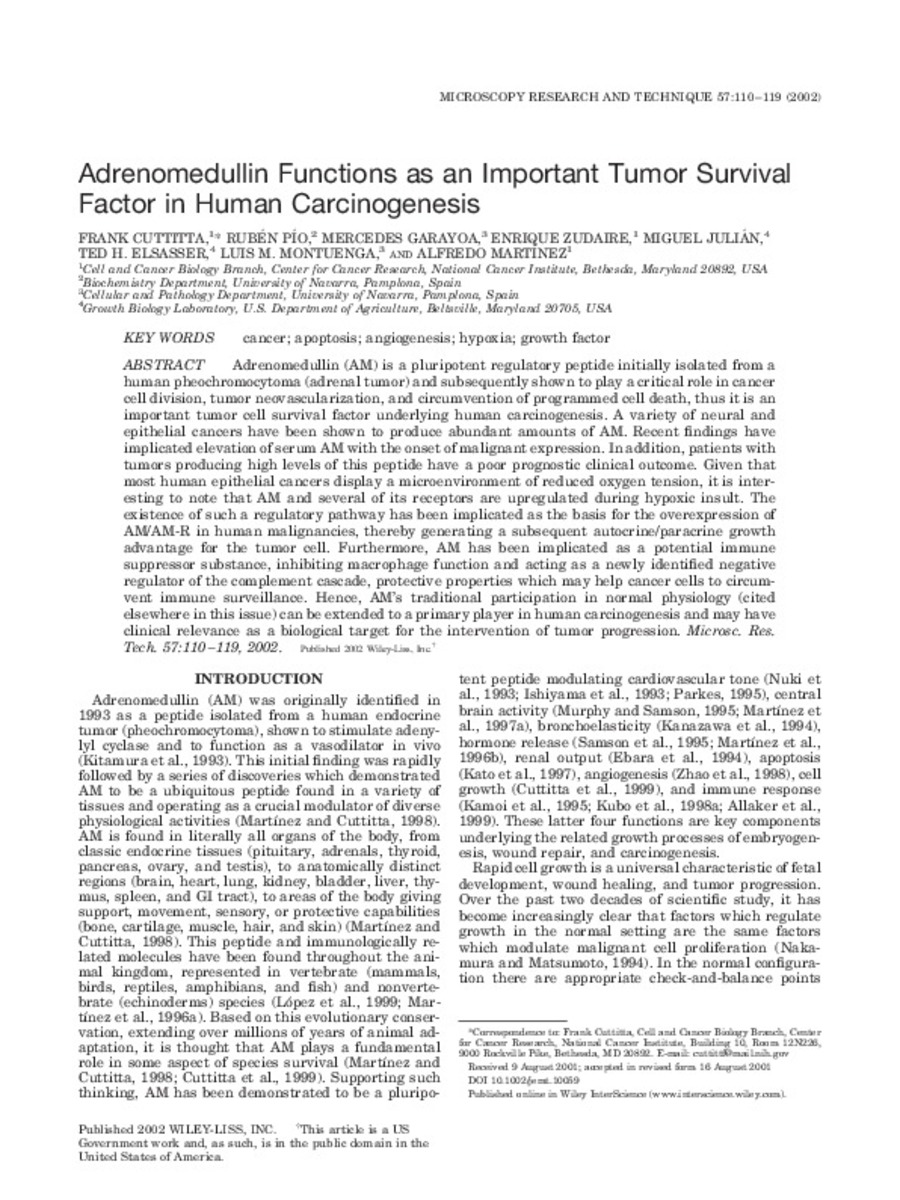Full metadata record
| DC Field | Value | Language |
|---|---|---|
| dc.creator | Cuttitta, F. (Frank) | - |
| dc.creator | Pio, R. (Rubén) | - |
| dc.creator | Garayoa, M. (Mercedes) | - |
| dc.creator | Zudaire, E. (Enrique) | - |
| dc.creator | Julian, M. (Miguel) | - |
| dc.creator | Elssasser, T. (T.) | - |
| dc.creator | Montuenga-Badia, L.M. (Luis M.) | - |
| dc.creator | Martinez, A. (Alfredo) | - |
| dc.date.accessioned | 2011-12-12T09:01:46Z | - |
| dc.date.available | 2011-12-12T09:01:46Z | - |
| dc.date.issued | 2002 | - |
| dc.identifier.citation | Cuttitta F, Pio R, Garayoa M, Zudaire E, Julian M, Elsasser TH, et al. Adrenomedullin functions as an important tumor survival factor in human carcinogenesis. Microsc Res Tech 2002 Apr 15;57(2):110-119. | es_ES |
| dc.identifier.issn | 1097-0029 | - |
| dc.identifier.uri | https://hdl.handle.net/10171/20182 | - |
| dc.description.abstract | Adrenomedullin (AM) is a pluripotent regulatory peptide initially isolated from a human pheochromocytoma (adrenal tumor) and subsequently shown to play a critical role in cancer cell division, tumor neovascularization, and circumvention of programmed cell death, thus it is an important tumor cell survival factor underlying human carcinogenesis. A variety of neural and epithelial cancers have been shown to produce abundant amounts of AM. Recent findings have implicated elevation of serum AM with the onset of malignant expression. In addition, patients with tumors producing high levels of this peptide have a poor prognostic clinical outcome. Given that most human epithelial cancers display a microenvironment of reduced oxygen tension, it is interesting to note that AM and several of its receptors are upregulated during hypoxic insult. The existence of such a regulatory pathway has been implicated as the basis for the overexpression of AM/AM-R in human malignancies, thereby generating a subsequent autocrine/paracrine growth advantage for the tumor cell. Furthermore, AM has been implicated as a potential immune suppressor substance, inhibiting macrophage function and acting as a newly identified negative regulator of the complement cascade, protective properties which may help cancer cells to circumvent immune surveillance. Hence, AM's traditional participation in normal physiology (cited elsewhere in this issue) can be extended to a primary player in human carcinogenesis and may have clinical relevance as a biological target for the intervention of tumor progression. | es_ES |
| dc.language.iso | eng | es_ES |
| dc.publisher | Wiley Blackwell | es_ES |
| dc.rights | info:eu-repo/semantics/openAccess | es_ES |
| dc.subject | Cancer | es_ES |
| dc.subject | Apoptosis | es_ES |
| dc.subject | Angiogenesis | es_ES |
| dc.subject | Hypoxia | es_ES |
| dc.subject | Growth factor | es_ES |
| dc.title | Adrenomedullin functions as an important tumor survival factor in human carcinogenesis | es_ES |
| dc.type | info:eu-repo/semantics/article | es_ES |
| dc.relation.publisherversion | http://onlinelibrary.wiley.com/doi/10.1002/jemt.10059/abstract | es_ES |
| dc.type.driver | info:eu-repo/semantics/article | es_ES |
Files in This Item:
Statistics and impact
Items in Dadun are protected by copyright, with all rights reserved, unless otherwise indicated.






